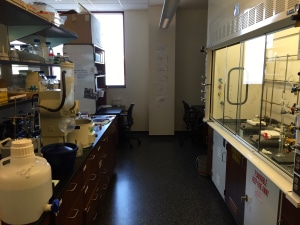This past Autumn Quarter, WRD Professor Sarah Read was granted the Collaborative Instruction Fellow Stipend issued by DePaul University’s Quality of Instruction Council, which is headed by Anne Bartlett of the Cross-College Collaboration (C3) Task Force.
Professor Read will use this grant to design a new Master’s level Chemistry course in collaboration with Professor Timothy French of DePaul’s Chemistry Department. This new course, Science Writing & Communication, will be co-taught by Read and French with the goal of teaching students how to communicate like a scientist. As the first course of its kind to be taught by two domain experts in writing and science respectively, Read and French hope that Science Writing & Communication will pave the way for further cross-disciplinary collaborations in the future.
The exigence for creating such a course arose from the manner in which science writing is often approached in universities. According to Read, writing instruction in science classes is focused primarily on the formatting of written reports instead of “the process of constructing scientific arguments.” As a result, science instructors frequently observe little writing improvement or development of scientific arguments in writing assignments over time.
Read and French have designed Science Writing & Communication to teach students how to present scientific facts supported by evidence in their writing. Furthermore, the class will emphasize that the process of writing is a crucial step towards creating scientific knowledge, and one that goes in hand-in-hand with performing experiments and analyzing/interpreting data. All of these skills are vital for scientists working in academia or industry.
By making stronger connections between writing and science, Read believes this course can challenge the “counterproductive notion that the scientific process and scientific writing and communication practices are independent of each other.”
Looking forward, Read is excited about future possibilities that could arise as a result of increased collaboration between departments in the College of Liberal Arts and Sciences and the College of Science and Health. More specifically, Science Writing & Communication may lead to additional courses that will feature teaching collaborations between the WRD and Chemistry Departments.
